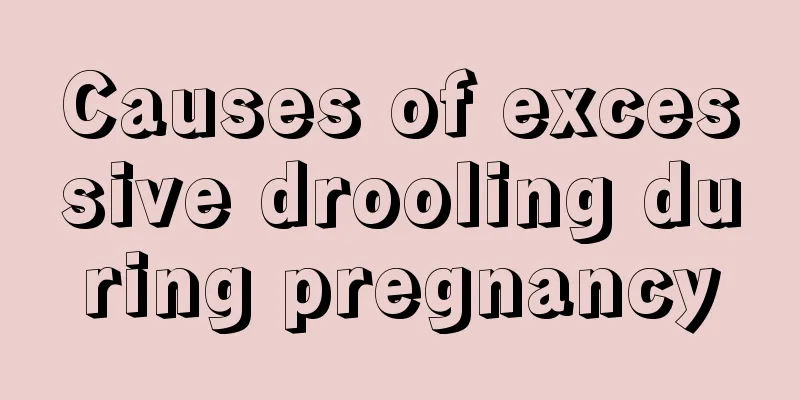Causes of excessive drooling during pregnancy

|
After a pregnant woman becomes pregnant, her body will definitely change compared to before pregnancy, and her body functions will also change. Some pregnant women experience stronger pregnancy reactions, while others do not. Many pregnant women have significantly more saliva in their mouths after pregnancy, which puzzles many people. In fact, increased saliva after pregnancy is a normal physiological phenomenon for pregnant women, so there is no need to worry too much. Next, I will tell you the reasons why pregnant women have increased saliva after pregnancy. Why do I drool a lot during early pregnancy? Increased salivation is also a common physiological phenomenon during pregnancy. Because the body's metabolism and blood circulation accelerate after pregnancy, the secretion of glands in the mouth is directly accelerated, and the secretion of saliva naturally increases. Of course, intestinal discomfort caused by pregnancy, such as indigestion, nausea, vomiting, intestinal flatulence, etc., will also indirectly affect the secretion rate of the glands in the mouth. This phenomenon of excessive glands usually disappears after a few months of pregnancy. Generally, the more severe the morning sickness of the pregnant woman, the more obvious this phenomenon is. Once morning sickness is over, the excessive saliva secretion will also end. Increased saliva in early pregnancy is a normal symptom and does not require special treatment. Just pay attention to daily health care. If morning sickness is severe, you can eat some foods that relieve morning sickness. In addition, you should pay attention to oral health during pregnancy to prevent various oral and dental diseases, as these problems will also affect the health and development of the fetus. In fact, it is a normal pregnancy phenomenon that you produce more saliva in the early stages of pregnancy. This is mainly because the body's metabolism becomes more vigorous after pregnancy, and the secretion of the glands in the mouth also speeds up, so more saliva is secreted. In addition, morning sickness may also stimulate the secretion of saliva. The above are the reasons why pregnant women have increased saliva after pregnancy. Increased drooling is normal. Excessive saliva secretion in pregnant women is closely related to morning sickness, as morning sickness stimulates saliva secretion. So don’t worry, the phenomenon of increased saliva will gradually improve over time, and once it recovers, no special treatment will be needed. I hope the above content can help you. |
<<: What to do if bleeding occurs 15 days after abortion
>>: How long should pregnant women use a belly belt after giving birth?
Recommend
How do women protect their cervix?
The cervix is a normal physiological characteri...
Tips for preventing mosquitoes in babies (Part 2)
In the previous article, we learned about the liv...
Polycystic ovarian follicles
Polycystic ovary syndrome is a very common diseas...
Why is my period delayed and I'm not pregnant?
Many girls find that their menstrual period does ...
Benefits of eating avocado for women
As women, ever since they have developed a love o...
Gastric cancer prefers Chinese stomachs? Sichuan tumor experts say: These eating habits are unacceptable! Kang Kang Comic Science Popularization ⑩
Welcome to Kang Kang Variety Show~ "Hello--c...
What to do if you have frequent uterine contractions at 36 weeks of pregnancy
People say that pregnant women are the happiest, ...
I lose weight very quickly during my period
Losing weight is very important for women who pur...
Can I use cupping to lose weight when I am menstruating?
Nowadays, more and more people are obese, and man...
Be careful of waist aging before aging! These postures are the most harmful to waist...
Sitting for a long day at work and lying down lik...
I still have some bleeding after half a month of medication.
After medical abortion, although the gestational ...
How many days after menstruation can I test for pregnancy
There are currently two ways to detect pregnancy:...
Why does it rain at night in Lhasa, Tibet? Lhasa cuisine and its characteristics
Lhasa is not only a tourist destination, but also...
【Medical Q&A】What is carrier screening?
Author: Sui Yilun Shanghai Ji'ai Genetics and...
Is it normal to have menstruation again after half a month?
Many women have their menstrual period only every...









